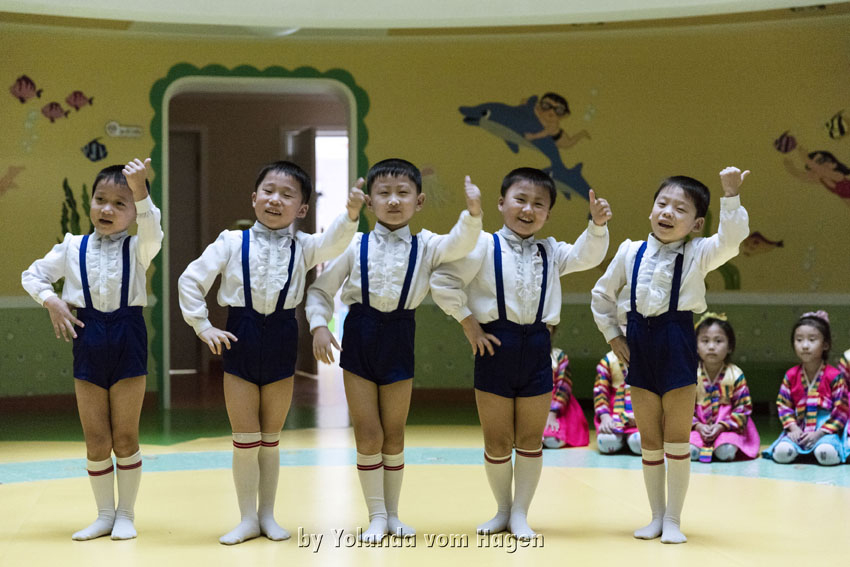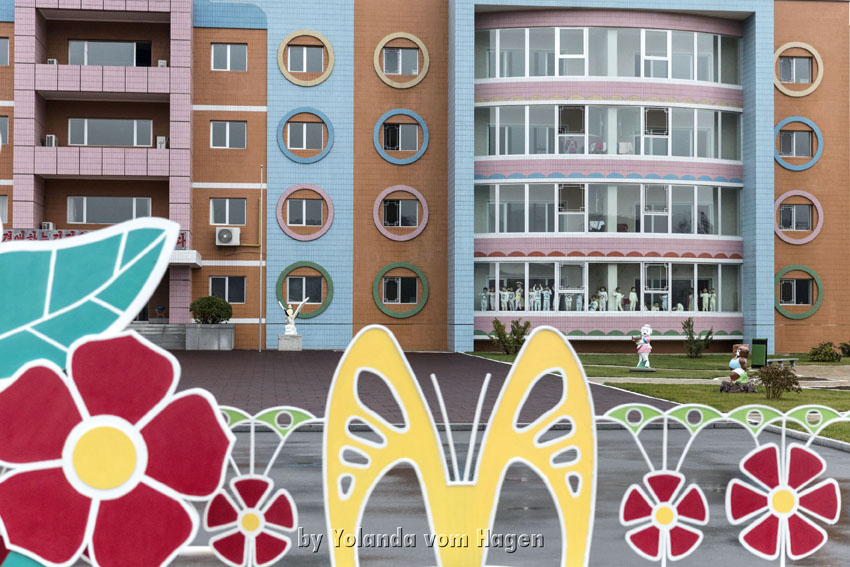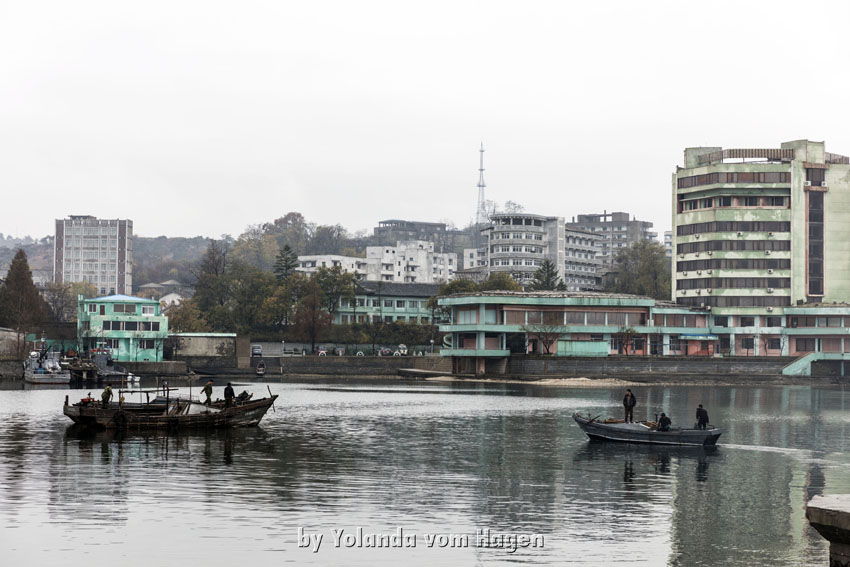Yolanda was a workshop leader for us in 2015. Here are her thoughts on the experience.
As our Air Koryo flight landed at Pyongyang’s Sunan airport, the contrast was strong between the gleaming new terminal building which wouldn’t have looked out of place in China, and the construction soldier-workers watching us curiously from the rooftops of surrounding houses.
Rain-soaked reflections of famous statues
Although this was the first time I had set foot in the country, my first real feeling of being in North Korea had been 24 hours earlier at the DPRK embassy in Beijing. I was visiting the country to teach body language skills at a business workshop for enterprising North Korean women, organised through a Singapore-based NGO called Choson Exchange, and so our first step was to pick up our education entry visas in China. With visa arrangements organised weeks in advance and the North Korean embassy hardly overloaded with visitors, this should have been a formality. Instead, we were met with blank faces and shrugs- at some point in the North Korean bureaucracy a link in the chain had failed, with the approval apparently somewhere in the Singaporean embassy. Our visas were not there. A few anxious hours of phone calls ensued and eventually with less than an hour before the embassy closed, our approvals were located.
One last night’s sleep in China before heading to Korea. Happy that the other group members seemed young and open minded, I felt safe to go and excited about a whole new experience. Many friends had warned me against going to North Korea, with views ranging from expressions of mild concern to outright opposition, but for me this was not a political trip but an opportunity to learn more about the people of this country- their lives, their traditions and their cultures. I had deliberately tried to avoid reading the news or books about North Korea so as to make myself a blank canvas with an open mind, ready to observe and soak up the experience without preconceptions or prejudice; insofar as possible to see it as it was, not through a filter.
Fishing near the Pyongyang Hotel
Part of the mystery of North Korea starts at Terminal 2 in Beijing- one of the few places in the world where North and South Koreans mix, before boarding flights to the separate parts of their 70-year divided country. The North Koreans in the line for Air Koryo were easy to pick out, with their red Kim lapel badges, Chinese electronic goods, and duty free spirits. There were even a group of North Koreans enjoying muffins and cappuccinos in Starbucks.
Sunan airport could at first glance be like a new terminal in a 3rd or perhaps 2nd tier Chinese city, but for the few little differences; the Kim portraits, the lack of advertising, and the customs control. After going through customs I was ordered- very politely-by a military official to go to a special area at the end for a laptop search. This was a heart-in-mouth moment- was he really going to search each and every photograph and file on the machine for heretical anti-Kim material? What would he say about two cameras?- but after logging on and giving it a cursory look over, he seemed happy enough and I was waved through.
City folk on the move
Our guides were there to meet us the other side of the gate, and the three of them would stay with our seven-strong group throughout the trip. I was happily surprised that our translators seem to be very open, young, friendly and with great English. Asians have a reputation for being quite small in stature, but Mr. Hwang, who would take overall responsibility for the trip, was as tall as me.
First on the agenda was the trip to the Mansu Hill Grand Monument to visit the towering bronze statues of Kim Il Sung and Kim Jong Il. The weather was really closing in at this stage, bleak and dark and teeming with rain, which somehow made the floodlight-bathed statues even more striking. Shivering and soaked, we headed onwards to our hotel.
More fishing
We were staying at the Pyongyang Hotel, which is very central in the downtown area of the city. It was much more comfortable than I expected and had even been equipped with floor heating. There was no internet or mobile operator to connect to- a blessing and retreat in my opinion, a huge burden for others. Several bars, coffee shops and even a KTV karaoke room proved to be popular evening spots for us to unwind with a surprising selection of Western songs. It is certainly a unique experience to sing ‘Born in the USA’ in the middle of North Korea.
Being downtown, I could watch the people of Pyongyang on their daily routines from my window. Most of the traffic is buses and trolleybuses, but there were an surprising number of taxis and a few private cars. Early morning is indeed a calm time in this country, with the promenade along the Taeddong river busy with people walking, cycling to work, playing card games, exercising and fishing.
Part of the workshop leading team during a role play illustrating different sales strategies.
I have lived in Shanghai for many years and speak Chinese, but was surprised to hear about some similarities in Korean. Unlike Chinese, they have no tones and they also have an alphabet (which is pretty simple to pick up- I could read quite a lot by the end of our week there), and perhaps half the words have some Chinese origin. A foreigner in Chinese is a ‘waiguoren’; in Korean it is a ‘waygugin’; some other words such as ‘san’ and ‘shan’ for mountain, and ‘ su’ or ‘shui’ for water sound even closer.
For the first three days of our trip, we were busy with running workshops for a group of around 58 Koreans- mostly women- who were starting or looking to start their own companies. We were a group of seven, teaching topics that included networking, scaling a business and building teams. My topic was the use of body language in business, and I spent a good deal of time with my translator, Mr Ku, in preparing our presentation. This was certainly a new topic for him, and I got the feeling that this level of expressiveness was something of a culture shock at first. In the west we are taught to be expressive and look people in the eye, but many Koreans seem to keep neutral expressions and don’t maintain eye contact. We worked through it together till late, and the lecture brought out lots of smiles and laughter from the initially reticent workshop attendees.
Shake
I explained them the meaning of a good handshake, eye contact and personal space in western culture, to illustrate that these three points are different from culture to culture, and also to draw on some universal values in non-verbal communication. The session I included on persuasion techniques was particularly fun, as I recruited three of the other workshop leaders to use an identical pitch to sell Mentos candies to the audience; one in an authoritarian style, another in a nervous and excitable style, and a third in a calm and relaxed one. At the end- even though many would not have understood the English-language pitch, the calm and relaxed style won through.
Later in the week, with the workshops completed, we headed out of Pyongyang to a city on the east coast called Wonsan. The journey was a revelation; it was only 200km away, but the road was heavily rutted and in all it took us nearly 6 hours. The countryside en route as we headed west was mostly farmland and mountains, dotted with villages, each of which had its own portraits or monuments to the Leaders, and many of which were accessible only by mud track. I saw many people on the side of the road waving to our bus to flag it down, and our guides explained that it is expected that if you have free space in your vehicle you offer people a ride. Our driver didn't stop and let them on, however.
On the road to Wonsan
At Wonsan we really had a taste for life outside the capital. Even in our tourist hotel, power was intermittent and the buildings were largely made of concrete and very damp. But there were a few notable exceptions- our Korean hosts took us to visit a brand new orphanage, opened only a few months earlier by Kim Jong Un himself. The standard of the facilities there was at such odds to everything else around that the place had a strange and artificial air, which wasn’t helped by the ‘impromptu’ dances that the children were encouraged to perform for us, or the anti-American wall decorations. It was a brand new facility, of course, which was part of the reason why the Koreans were keen to show it to us- but everything looked so new, perfect and almost untouched, I found it somewhat cold and lacking that homely ‘lived in’ feel. I can’t really put my finger on why I found the orphanage so unsettling, but others I spoke to seemed to share this sentiment. As the rows of children waved us off, I wondered what their day to day lives were really like, and how things would turn out for them.
On our final morning, we took our last bus ride to Pyongyang station, and bade our farewells to our Korean guides- our new Korean friends- who had supported this cultural exchange. I could only imagine the immense amount of work they had put in to make it productive and successful. It was an emotional moment, and it was suddenly apparent after a week together that again we were ‘us’- going back to our lives and various countries, and ‘they’- staying here in North Korea, and I felt tears running down my face as I boarded the train.
Our Beijing-bound train left promptly at 1010 that morning, heading north at a crawling pace towards China on a train crowded with Korean and Chinese traders and tourists. The same pattern of villages and mountains ensued, with fields of cabbages being harvested for the year’s kimchi production. I don’t think I’ve ever eaten so much- or such good- kimchi in all my life as I did that week in Korea. We continued onwards and northwards, with occasional stops at local stations and lots of time to ponder what I had experienced over the past week. Finally, a wall of skyscrapers was visible to our north- we had reached China.
Dandong looms












